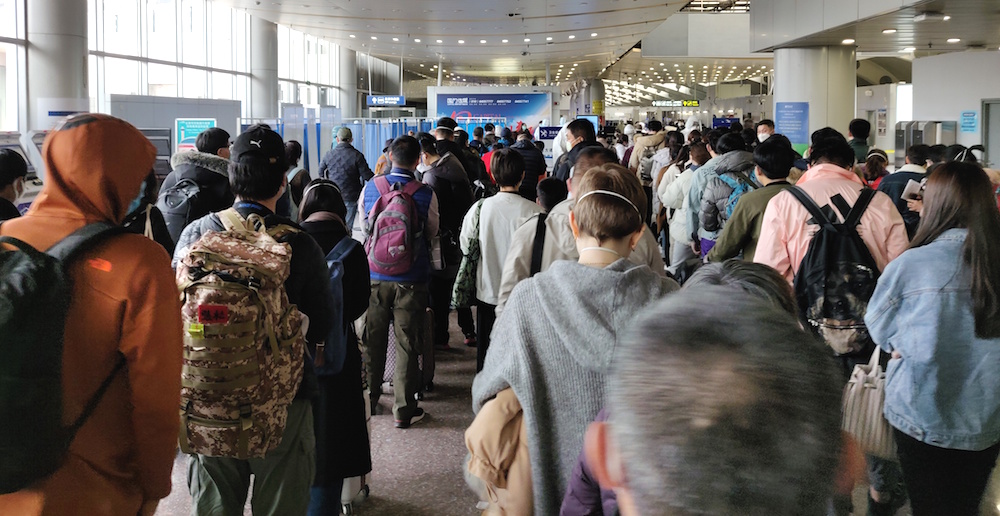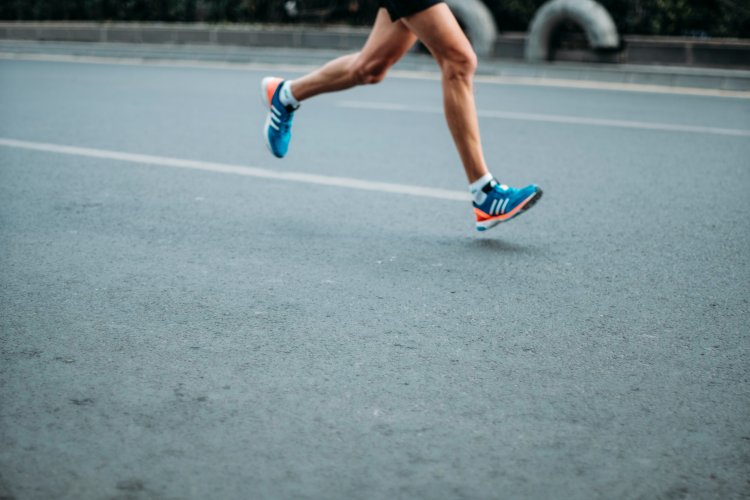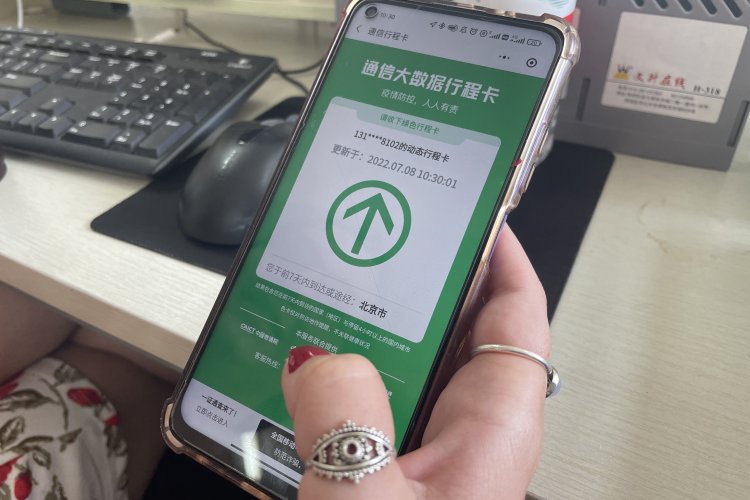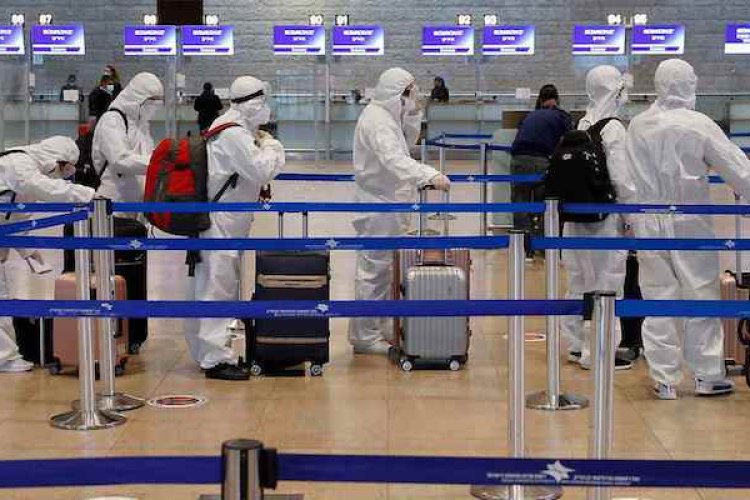Flying Into Beijing? Here's What You Can Expect
With all the news the status of the coronavirus around the world that we're constantly bombarded with, the simpler details and alterations to our regular life can easily evade us. Dealing with Beijing airport immigration and security, a once routine, vaguely annoying procedure, is no exception. However, we're happy to report that other than a few more formalities and a little extra time, flying into Beijing Capital International Airport from Hong Kong this morning was relatively hassle-free. From our experience, these are some of the things you can expect to encounter along the way.
Disinfection
On our flight, the cabin was disinfected before the descent, with one member of the cabin crew walking down the length of the aisle spraying two canisters held high above her head. This stuff does smell quite strongly, even with a mask on, so it's not a bad idea to cover your eyes and mouth if you are sensitive to such things.
Health declaration form
Before landing, all passengers (Chinese and foreign) are handed a health declaration form detailing travel over the previous 14 days, any potential contact with infected persons, and current health situation. (This in addition to the regular yellow arrival card that foreigners must complete and present to immigration. Try to carry a pen so as to avoid sharing one of the four kindly shared by the cabin crew among the entire plane.)
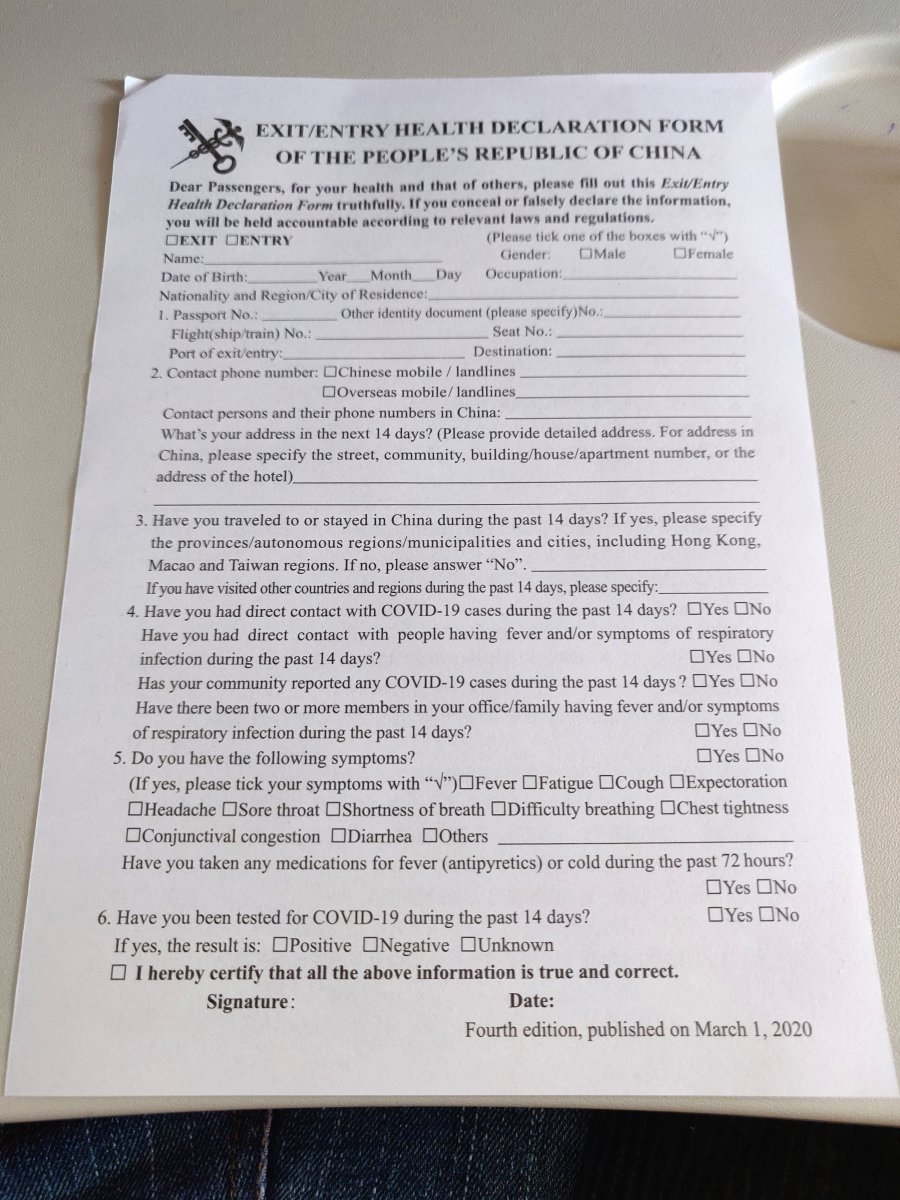
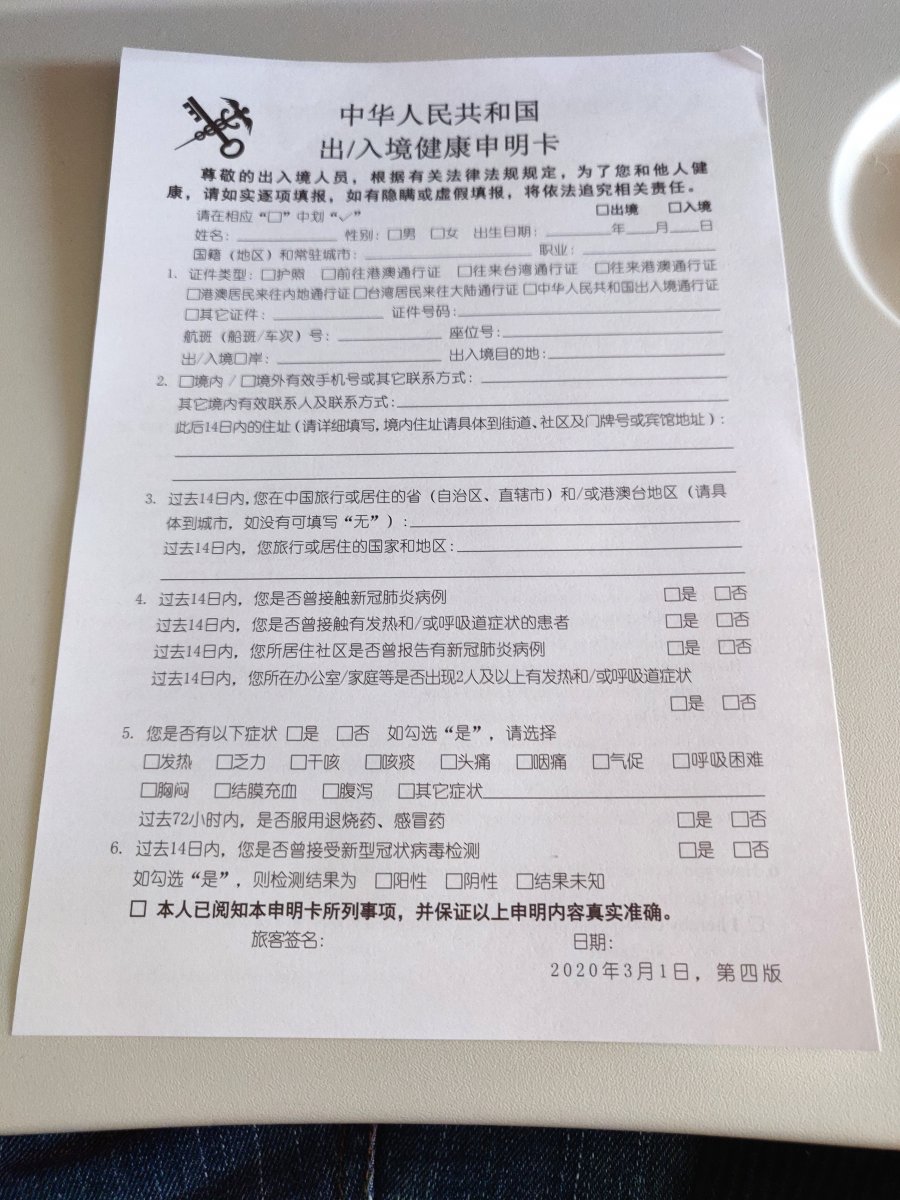
Assuming nobody on the flight has been flagged as possibly infected (more on what that scenario might look like here), alighting the plane should progress as usual. Once you're off the plane, follow the exit signs and first hit up the passport scan machines, which will verify whether your fingerprints are already on file (if they are, you'll simply receive a square piece of paper stating "OK, reusable."). Now the real fun begins.
Health declaration form check
Before getting to customs, everyone must have their aforementioned health declaration form checked. Although the five or so unmarked lines had all the markings of a scrum on the cusp, this portion was surprisingly orderly and efficient.
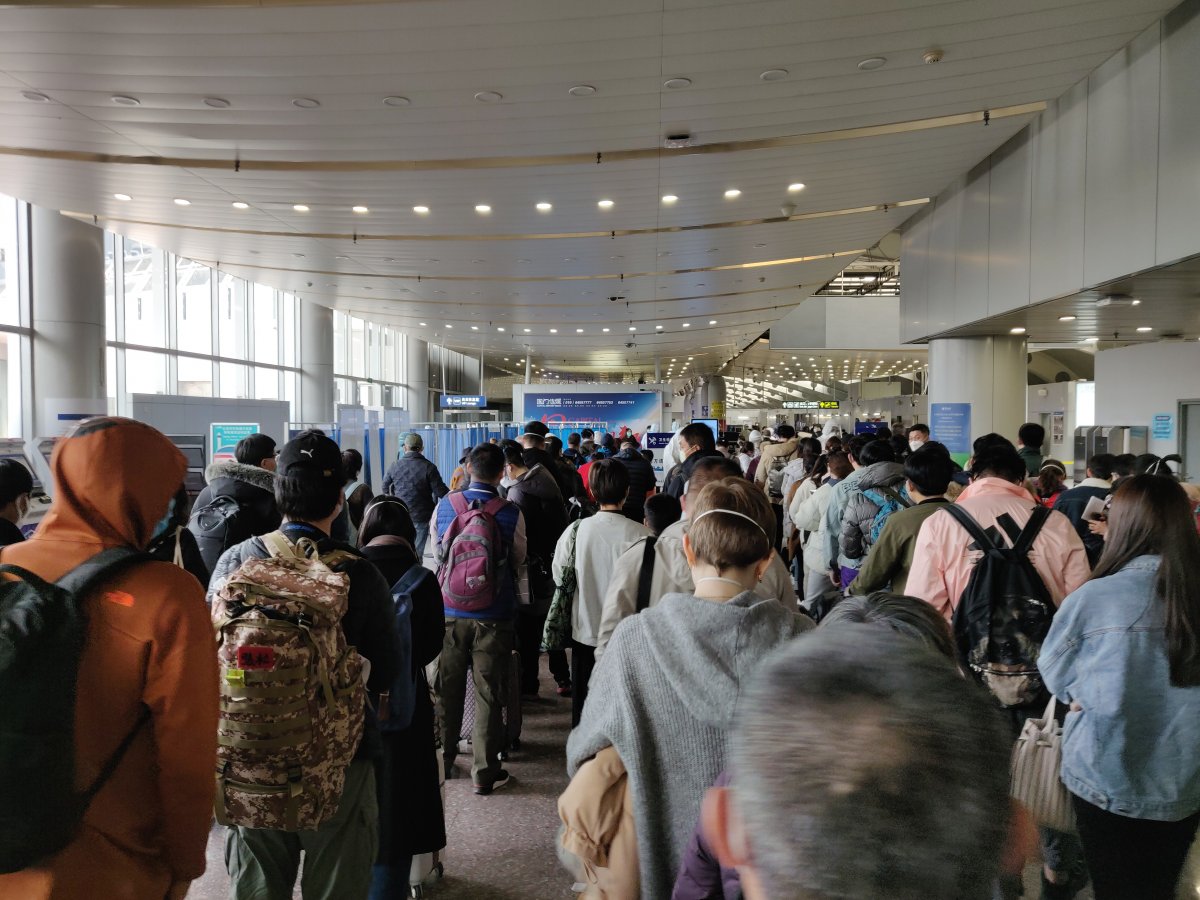
Or at least it was for those who had managed to read all the way to the bottom of the questionnaire and tick all the appropriate boxes. Even with all the frantic pen-seeking, getting to the front took less than 10 minutes, where a man in hazmat suit double-checks your answers and travel information.
Immigration
Go through an infrared temperature check and then on to immigration. Before you've even reached a window you'll be asked if you have visited either South Korea, Italy, Iran, or Japan in the past two weeks. As of Mar 3, these are all considered high-risk countries and anyone who has visited them will be required to conduct a 14-day quarantine, according to the rules of your residential compound. What that means for tourists with pre-booked accommodation is unclear but from what we could tell, anyone who had visited one or more of these countries was to provide additional information on where exactly they visited on the back of their arrival card.
With any luck, you will be able to move through customs without too much hassle so that you can return home, where you should commit to a two-week self-quarantine – even if you don't have to.
Finally, the State Council of the People's Republic of China released an infographic via their website about some of the broader details of entry and exit into China for foreigners (read our more in-depth take here). What it lacks in specifics, the illustration more than makes up for with its depiction of a very disgruntled and hazmatted customs worker armed with a thermometer gun.

READ: Schools Advise Beijing Teachers, Students Abroad to Stay Away For Now
Images: Tom Arnstein, The State Council of the People's Republic of China
Related stories :
Comments
New comments are displayed first.Comments
![]() Sikaote
Submitted by Guest on Wed, 06/17/2020 - 17:17 Permalink
Sikaote
Submitted by Guest on Wed, 06/17/2020 - 17:17 Permalink
Re: Flying Into Beijing? Here's What You Can Expect
I love the second part of question #3: If no, please answer "No".
Are 'nah' or 'nope' valid answers? Enquiring minds must know.

![]() Sikaote
Submitted by Guest on Wed, 06/17/2020 - 17:16 Permalink
Sikaote
Submitted by Guest on Wed, 06/17/2020 - 17:16 Permalink
Re: Re:flying into Beijing but what about the train?
Is this the same for Trains? I mean I'm flying in from Malaysia on the 25th and I don't want the new centralised 14 day quarantine but happy to do it at my apartment. Would coming in on the train be okay?
How do we know we can trust you? What about the people you expose on the way home? How about going out for groceries? The line between caution and paranoia has gotten blurry of late. So man up and fall on the quarantine grenade.

![]() Sikaote
Submitted by Guest on Wed, 06/17/2020 - 17:15 Permalink
Sikaote
Submitted by Guest on Wed, 06/17/2020 - 17:15 Permalink
Re: Flying Into Beijing? Here's What You Can Expect
Flying Into Beijing? Here's What You Can Expect
One can expect to see lots and lots of Chinese people.

![]() qingdao123_
Submitted by Guest on Tue, 03/17/2020 - 19:01 Permalink
qingdao123_
Submitted by Guest on Tue, 03/17/2020 - 19:01 Permalink
Re: Re:flying into Beijing but what about the train?
Is this the same for Trains? I mean I'm flying in from Malaysia on the 25th and I don't want the new centralised 14 day quarantine but happy to do it at my apartment. Would coming in on the train be okay?
You will be quarantined at your China entry point.
![]() AlexIdds
Submitted by Guest on Mon, 03/16/2020 - 17:07 Permalink
AlexIdds
Submitted by Guest on Mon, 03/16/2020 - 17:07 Permalink
Re:flying into Beijing but what about the train?
Is this the same for Trains? I mean I'm flying in from Malaysia on the 25th and I don't want the new centralised 14 day quarantine but happy to do it at my apartment. Would coming in on the train be okay?
Validate your mobile phone number to post comments.

